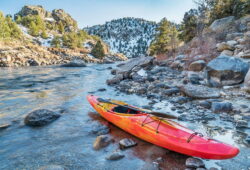Is it safe to kayak in Florida?
The answer is not always straightforward. There are definitely some risks to be aware of, which can impact your safety and your life.
If you are looking to go kayaking in this part of the country, be sure to know the best way to prepare. This way, you can make the most out of your trip and have a wonderful experience reconnecting with nature.
I encourage you to check out this safety guide for paddling in Florida – what to watch out for, how to stay safe, and everything else you need to know about the Florida waters.
Contents
Common Concerns to Know – Is It Safe to Kayak in Florida?
There is no doubt that Florida is a gorgeous place to go kayaking.
In fact, this state is teeming with several options for paddlers, according to the Florida Fish and Wildlife Conservation Commission.
Whether you are a beginner paddler or more advanced, there is something that would suit your fancy.
Families with young children also go to Florida to go kayaking and canoeing. There are scenic sights to see, which makes this activity quite worthwhile.
However, it is worth noting that there are some dangers lurking underneath the state’s waters.
Brackish or freshwater is home to alligators, which can be a cause of concern for some paddlers. In fact, there are some reports from paddlers of an encounter with alligators.
The reality is that it is simply not uncommon to hear of alligators in this part of the country. In Florida, there are quite a number of crocodiles found in the extreme southern portion. On the other hand, alligators settle in the Florida keys and a few other locations in the state.
With these things in mind, it is important to be aware of your surroundings before you head out to go kayaking or canoeing in Florida.
What You Should Know About Alligators in Florida
Alligators typically prefer blackwater rivers. However, they may also be found in freshwater, in addition to crocodiles.
Some encounters with alligators happen at day while most instances are at dusk, night time, or dawn. These are the common times of the day when these reptiles are highly active.
If you are doing recreational kayaking in Florida, you need to be cautious at all times. Many reports of such alligator encounters involve accidentally bumping the kayak into this reptile. At times, the creature may be in shallow waters and startled by your boat.
On other occasions, although rare, alligators tend to bite kayaks. When this happens, this can cause so much fear to individuals affected by such attacks. Moreover, this can lead to some minor injuries, as well as damages to the vehicle.
Thus, many people wonder – is it safe to kayak in Florida?
Yes, it is. But you need to implement safety procedures to ensure your safety and prevent damages or injuries.
Here are some steps you can take to make sure that you stay safe during your kayaking adventure.
1. Stay inside the boat.
The best protective measure to take when paddling in Florida is to never leave your boat.
Be sure to keep your feet and hands inside your kayak all the time as you paddle along the river. Never let your children stick their arms out in the water, especially when you are heading in unfamiliar locations.
2. Choose your kayaking schedule.
As much as possible, you should go paddling when it is daytime.
You should avoid dusk or dawn, and most especially nighttime. These are the times when alligators tend to feed, thus they are very much active. If you can choose your schedule for exploring the waters, always stick to mid-day or early afternoon.
3. Avoid swimming in the water.
While it may seem enjoyable to take a dip in the water, you can never be too sure what lies beneath. This is why I highly advise that you take caution and avoid swimming, especially if you are uncertain about the area.
When kayaking with your pets, make sure they remain in the boat all the time. Dogs, in particular, are at a high risk from these alligator attacks.
4. Opt for a sturdier kayak.
Next, you need to inspect your kayak before heading out. Check for punctures and damages that can expose you to greater risks. I would recommend that you use hard plastic canoes instead of inflatable ones. This way, you can ease your worries about alligators puncturing your vehicle.
5. Be alert.
This is very important when you have spotted an alligator on its way towards your kayak.
Be prepared to paddle as fast as possible away from the reptile that is approaching you. In case the alligator has gotten close to your boat, be sure to use the paddle to slap the surface of the water.
This action should scare away the alligator while allowing you to escape and paddle away quickly. You can also rap the reptile on its snout using your paddle if it bites your kayak. While this scenario is not common, it is best to know what to do once it does occur.
6. Wear your PFD.
Most importantly, you need to have your personal floatation device on you at all times.
There may not be any alligators nearby but drowning can be another concern in the deep waters. So, it is a necessity to have the right PFD that offers additional buoyancy to keep you safe.
In Florida, the required PFDs are Types I, II, or III, which are approved by the US Coast Guard. They must also be in good condition without any damages. And most of all, they should fit you well.
Read More: Practical Guide on How To Paddle A Kayak Upstream – Kayaking Tips for All Levels
Watch this video to learn more about these tips to stay safe when kayaking.
Final Words
You may be wondering – is it safe to kayak in Florida?
Well, don’t let your fears stop you from enjoying the beautiful nature in this part of the world. Make it a point to apply these tips to stay safe and eliminate any risks during your kayaking trip.





OK. Great article. Let’s correct the misinformation.
“Alligators typically prefer blackwater rivers. However, they may also be found in freshwater, in addition to crocodiles.”
Not exactly sure what a “blackwater river” is however the implication is that it’s not freshwater. If you meant to say rivers where there is not good clarity due to tannins in the water that would be correct. Those rivers however are all freshwater. Although you may occasionally find an alligator straying into a saltwater canal or even the gulf it’s quite rare. So what you should have said is rarely they can be found in saltwater. They are nearly ALWAYS found in fresh water.
“Some encounters with alligators happen at day while most instances are at dusk, night time, or dawn. These are the common times of the day when these reptiles are highly active.”
Also 100% false. Most and nearly all encounters will alligators occur during the day when people are actually on the water in large numbers, walking their pets near retention ponds etc. I can only think of a few times I’ve even heard of an attack on a person at night. Very unusual. However you are correct they are more active at night when very few people are in the water and the ones that are typically know better than to put themselves at risk. The warning to be more cautious at night, dawn and dusk is accurate. The statement that most instances happen at night is simply false.
As for paddling away, slapping the water, etc. Great idea. Paddle away. However you need to realize that if you are paddling away and the alligator doesn’t bother you it’s because it had not intentions of doing so. Alligators can swim at the same speed as a bottlenose dolphin so nobody is paddling away from an alligator. Just not happening. It’s like the absurd stories people tell about encountering and alligator in the water and it chasing them and they somehow outswam it. Fiction my friends. Nobody in the water from the same or even approximate starting point is outswimming an alligator. Not happening. You also aren’t outrunning them for the rest of you. They can run up to 35mph.
Alligators for the most part have absolutely no interest in people and are scared of us. The most important points you failed to mention which is remarkable is if you see babies don’t hang around and don’t try to get too close because mother gators do protect their young and are likely around even if you don’t see them. The second is to be extra vigilant during mating season when the males become more territorial. Two of the most important things people should know that are never mentioned.
As for kayaking being safe. I cannot recall any story of someone getting killed by a gator on a kayak. So as far as alligators causing risk to kayaking. the risk is probably smaller than winning the lottery. So as far as safety from the standpoint of risk from wildlife kayaking is essentially VERY safe in Florida.